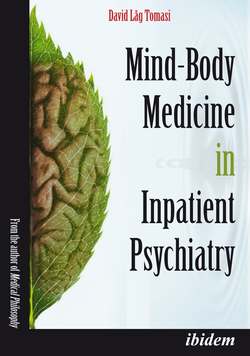Читать книгу Mind-Body Medicine in Inpatient Psychiatry - David Låg Tomasi - Страница 6
На сайте Литреса книга снята с продажи.
ОглавлениеERZEUGT DURCH JUTOH - BITTE REGISTRIEREN SIE SICH, UM DIESE ZEILE ZU ENTFERNEN
Foreword by Nonna Aydinyan-Allaire
A guide for professionals to learn effective treatment and management strategies in inpatient psychiatry
In this dense but well-reasoned and open-minded study, Scientist, College Professor and Psychotherapist at the University of Vermont Medical Center (UVMMC), Dr. David Tomasi digs deep into previously unpublished data collected over a period of 5 years at UVMMC in inpatient psychiatry unit to conduct a meta-analysis research study of Mind-Body Medicine in Psychotherapy, in order to utilize better support in the healing process and treatment plans for patients with multiple mental health diagnoses.
A thorough display of a vast knowledge in philosophy, clinical psychology, psychiatry and psychotherapy is found in this research study applying quantitative and qualitative analysis through surveys, questionnaires, as well as referencing his previously published research “Medical Philosophy. A Philosophical Analysis of Patient Self-Perception in Diagnostics and Therapy” (Tomasi, 2016) and “Wishful thinking, hope, and placebo. Exploring the connections between religion and medicine beyond illusion, delusion, and ideation” (Tomasi, 2015). Tomasi breaks down his data collection and research findings into three main areas: Individual and Group Therapy Sessions, Exercise Groups and Group Attendance and Session Standardization. He then further analyzes the therapeutic relationship and alliance and how to apply Mind-Body medicine to psychotherapy. Tomasi finds a strong correlation between therapeutic outcomes and patient-provider therapeutic alliance. The author wonderfully highlights in his research how strategies from positive psychology, spirituality or religion, gentle exercise and physical activation, play key stones in developing coping skills; identifying grief/loss, feelings, and stressors/problems; increasing activity level, increasing affective range; etc.
Through this research work and ongoing study, Tomasi hopes for future investigations on on the benefits of constant, gentle and monitored physical exercise on psycho-physical health of the patients in the inpatient psychiatry Unit at UVMMC. He concludes his research by addressing the connections between religion and medicine in discussing wishful thinking, hope and placebo. Tomasi encourages readers to ask themselves how come the placebo effect seems to be more manifested in some cases and less or almost non-manifested in others? Tomasi draws attention to how our physical health depends on our sense of connectedness with others including health providers.
Well worth reading for the general public, but especially healthcare professionals in different fields.
